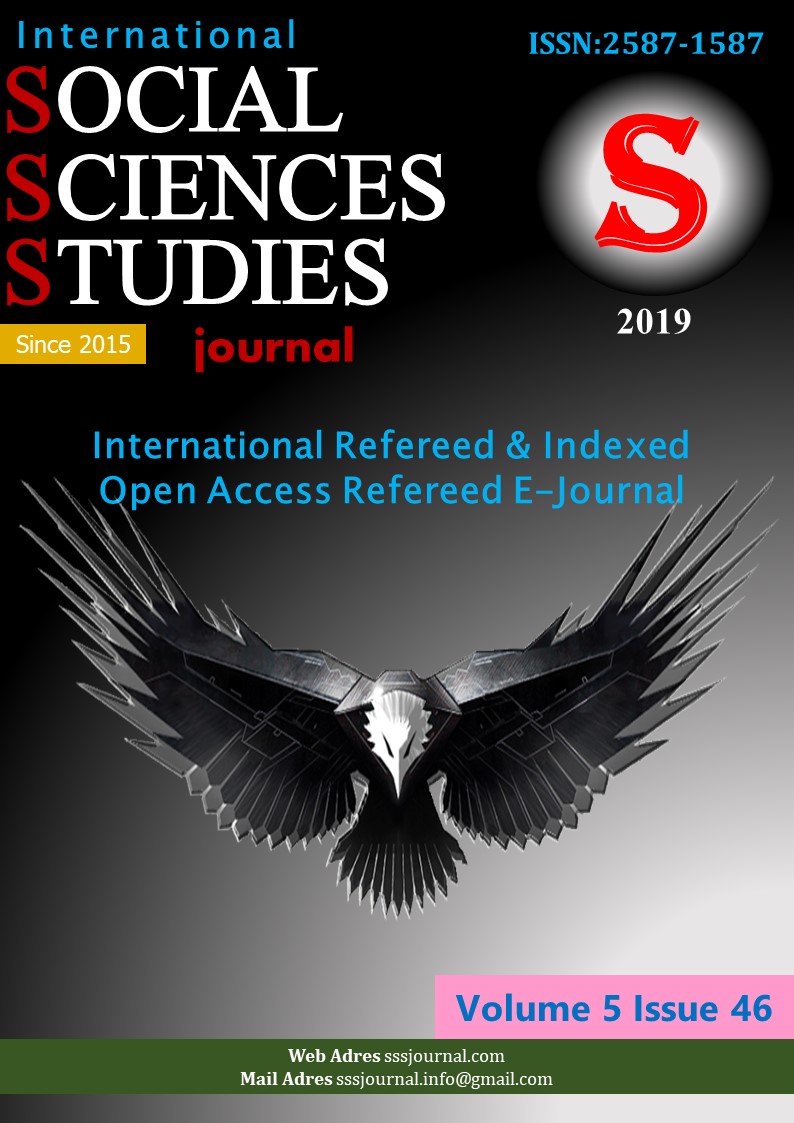Author :
Abstract
Bu çalışma, egemenliğin, mutlak ve sınırsız olarak tanımlandığı 16. yüzyıldan, 2000’lerle birlikte halkına ve uluslararası topluma karşı sorumlu olduğu görüşünün yaygınlık kazandığı süreci, tarihsel ve teorik bakımdan ele almaktadır. Bu çalışmanın hipotezi, geleneksel egemenliğin sınırlarını aşındıran koruma sorumluluğu kavramının Soğuk Savaş'tan sonra ortaya çıkan koşullar sonucunda ortaya çıktığı ve bu kavramın aynı zamanda egemenliğinin mutlak ve sınırsız doğasını sınırlamaya başladığıdır. Çalışma, insan hakları liberalizmi ve liberal kurumsalcılık temelinde gerçekleştirilmiştir. Çalışmaya farklı fikirler dahil edilmiştir ve bunları karşılaştırarak bazı sonuçlara varılmıştır. Bu amaçla geniş bir literatür taraması yapılmıştır.
Keywords
Abstract
This study examines the process from the 16th century, when sovereignty was defined as absolute and unlimited, from the 16th century to the 2000s, where the responsibility to the international community and the people was taken up. The hypothesis of this study is that the concept of the responsibility to protect eroding the boundaries of traditional sovereignty has arisen as a result of conditions emerging after the Cold War, and that this concept has also started to limit the absolute and unlimited nature of its sovereignty. The study is carried out on the basis of human rights liberalism and liberal institutionalism. Different ideas are included in the study and some conclusions have been reached by comparing them. For this purpose, a wide literature review has been made.
Keywords
- “What’s Causing the Conflict in Ivory Coast?” (05.11.2011), CNN,
- “What’s Causing the Conflict in Ivory Coast?” (05.11.2011), CNN,http://edition.cnn.com/2011/WORLD/africa/04/03/ivory.coast.explainer/index.html. (Accessed Date: 25.11.2018).
- AĞAOĞULLARI, Mehmet Ali (2012), Sokrates’ten Jakobenlere Batı’da Siyasal Düşünceler, İstanbul, İletişim Yayınları.
- ARMAOĞLU, Fahir (2014), 19. Yüzyıl Siyasi Tarihi 1789-1914, (14. Baskı), İstanbul, Timaş Yayınları.
- ARSAVA, Füsun A. (2011), “Egemenlik ve Koruma Sorumluluğu”, Gazi Üniversitesi Hukuk Fakültesi Dergisi, Cilt: 15(1), p. 101-124.
- AYOOB, M. (2002), “Humanitarian Intervention and State Sovereignty”, The International Journal of Human Rights, Cilt: 6(1), p. 81-102.
- BADESCU Cristina G. & Weiss Thomas G. (2010), “Misrepresenting R2P and Advancing Norms: An Alternative Spiral?”, International Studies Perspectives, Cilt: 11(4), p. 354-374.
- BELLAMY, Alex J. & WİLLİAMS, Paul D. (2011), “The New Politics of Protection? Cote d’Ivoire, Libya and the Responsibility to Protect”, Royal Institute of International Affairs, Cilt: 87(4), p. 825-850.
- BELLAMY, Alex J. (2005), “Responsibilty to Protect or Trojan Horse? The Crisis in Darfur and Humaitarian Intervention afer Iraq”, Ethics & International Affairs, Cilt: 19(2), p. 31-54.
- BELLAMY, Alex J. (2008), “The Responsibility to Protect and the Problem of Military Intervention”, Royal Institute of International Affairs, Cilt: 84(4), p. 615-639.
- BERİŞ, Hamit Emrah (2008), “Egemenlik Kavramının Tarihsel Gelişimi ve Geleceği Üzerine Bir Değerlendirme”, Ankara Üniversitesi SBF Dergisi, Cilt: 63(1), p. 55-80.
- CROXTON, Derek (1999), “The Peace of Westphalia of 1648 and the Origins of Sovereignty”, The Inrernational History Review, Cilt: 21(3), p. 569-591.
- ÇAKMAK, Cenap & ATILGAN, Cansu & EROĞUZ, Esra (2016), “Devlet Egemenliğinde ve KuvvetKullanmada Dönüşüm: İnsani Müdahaleden Koruma Sorumluluğuna”, BİLGESAM, Rapor No: 71, p. 1-46. ETZİONİ, Amitai (2006), “Sovereignty as Responsibility”, Orbis, Cilt: 50(1), p. 71-85.
- EVANS, Gareth, & SAHNOUN, Mohamed (2002), “The Responsibility to Protect”, Foreign Affairs, Cilt: 81(6), p. 99-110.
- FOLEY, Conor (2013), “The Evolving Legitimacy of Humanitarian Intervention”, International Journal on Human Rights, Cilt: 10(19), p. 75-93.
- HAKYEMEZ, Yusuf Şevki (2004), Mutlak Monarşilerden Günümüze Egemenlik Kavramı, Ankara, Seçkin Yayıncılık.
- ICISS (2011), “The Responsibility to Protect”, International Development Research Centre. KAPANİ, Münci (2007), Politika Bilimine Giriş, Ankara, Bilgi Yayınevi.
- KARABULUT, Bilal (2016), Uluslararası İlişkiler Kvramlar-Teoriler-Kurumlar, Ankara, Barış Kitap.
- KESKİN, Funda (2006-2007), “İnsancıl Müdahale: 1999 Kosova ve 2003 Irak Sonrası Durum”, Uluslararası İlişkiler, Cilt: 3(12), p. 49-70.
- KESKİN, Funda (2009), “Darfur: Koruma Yükümlülüğü ve İnsancıl Müdahale Kavramları Çerçevesinde Bir İnceleme”, Uluslararası İlişkiler, Cilt: 6(21), p. 67-88.
- LYNCH, Jake (2011), “Responsibility to Protect After Libya”, International Journal of Peace Studies, Cilt: 16(2), p. 59-76.
- MOİTA, Luis (2012), “A Critical Review on the Consensus around the Westphalian System”, E-Journal of International Relations, Cilt: 3(2), p. 17-42.
- NAGAN, P. Winston & HAMMER Craig (2004), “The Changing Character of Sovereignty in InternationalLaw and International Relations”, UF Law Faculty Publications, p. 142-187, http://scholarship.law.ufl.edu/facultypub/595.
- OSİANDER, Andreas (2001), “Sovereignty, International Relations, and the Westphalian Myth”, International Relations, Cilt: 55(2), p. 251-287.
- PANDİARAJ, S. (2016), “Sovereignty as Responsibility: Reflections on the Legal Status of the Doctrine of Responsibility to Protect”, Chinese Journal of International Law, Cilt: 15(4), p. 795-815.
- PİİPARİNEN, Touko (2013), “Responsibility to Protect: The Coming of Age of Sovereignty-Building”, Civil Wars, Cilt: 15(3), p. 380-405.
- REÇBER, Sercan (2016), İnsancıl Müdahale ve Koruma Sorumluluğu, (1. Baskı), İstanbul, On İki LevhaSAK, Yıldıray (2015), “Uluslararası Hukukta İnsancıl Müdahale ve Libya Örneği: Suriye’de Yaşanan ya da Yaşanacaklar İçin Dersler”, Uluslararası İlişkiler, Cilt: 11(44), p. 121-153.
- SANDER, Oral (2009), Siyasi Tarih: İlkçağlardan 1918’e, Ankara, İmge Kitabevi Yayınları.
- TELLİ, Azime (2012), “İnsani Müdahaleden Koruma Sorumluluğuna Geçiş: Eski Sorun Yeni Kavram”, NEÜ Sosyal Bilimler Enstitüsü Dergisi, Cilt: 1(2), p. 206-220.
- THOMAS, Nicholas, & TOW, William T. (2002), “The Utility of Human Security: Sovereignty and Humanitarian Intervention”, Security Dialogue, Cilt: 33(2), p. 177-192.
- ULUSOY, Ülkü Halatçı (2013), “Uluslararası Hukuk Açısından Libya ve Suriye Örneğinde Koruma Sorumluluğu”, TAAD, Cilt: 4(14), p. 269-297.
- UN Charter, http://www.un.org/en/sections/un-charter/un-charter-full-text/. (Accessed Date: 21.11.2018).
- United Nations General Assembly (2005), “Resolution A/RES/60/1”, http://www.un.org/en/ga/search/view_doc.asp?symbol=A/RES/60/1., (Accessed Date: 16.11.2018).
- United Nations Security Council (2006), “Resolution 1674”,http://www.un.org/en/ga/search/view_doc.asp?symbol=S/RES/1674(2006)., (Accessed Date: 16.11.2018).http://www.un.org/en/ga/search/view_doc.asp?symbol=S/RES/1970(2011)., (Accessed Date: 16.11.2018).
- Weiss, Thomas G. (2004), “The Sunset of Humanitarian Intervention? The Responsibility to Protect in a Unipolar Era”, Security Dialogue, Cilt: 35(2), p. 135-153.
- Weiss, Thomas G. (2013), “Humanitarian Intervention and U.S. Policy”, Great Decisions, p. 59-70.
- Western, Jon (2011), “Protecting States or Protecting Civilians: The Case for R2P”, The Massachusetts Review, Cilt: 52(2), p. 348-357.
- Yalvaç, Faruk (2009), Devlet, Devlet ve Ötesi: Uluslararası İlişkilerde Temel Kavramlar, Atila Eralp (Der.),(p. 15-53), İstanbul, İletişim Yayınları.





